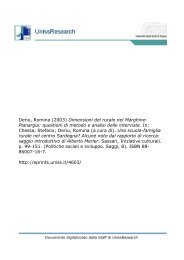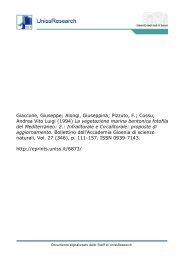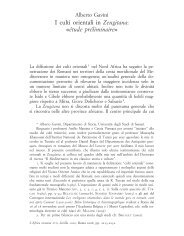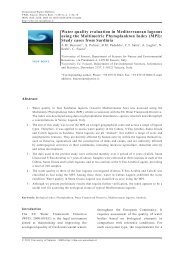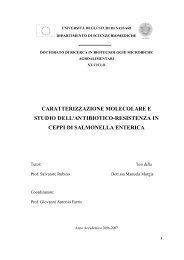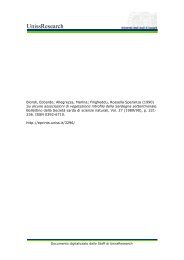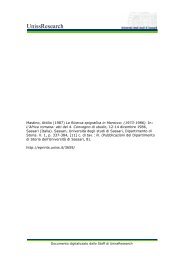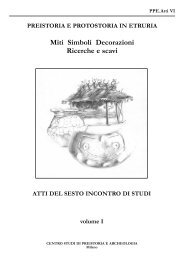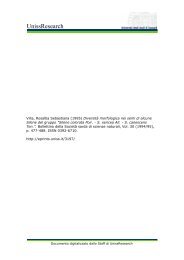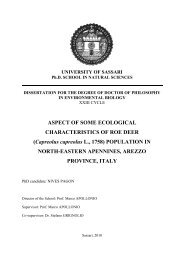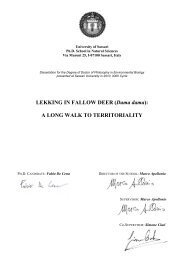- Page 1 and 2:
UNIVERSITA’ DEGLI STUDI DI SASSAR
- Page 3 and 4:
Funzioni e competenze della Polizia
- Page 5 and 6:
Tesi di dottorato in Scienze della
- Page 7 and 8:
Tesi di dottorato in Scienze della
- Page 9 and 10:
Tesi di dottorato in Scienze della
- Page 11 and 12:
Tesi di dottorato in Scienze della
- Page 13 and 14:
Tesi di dottorato in Scienze della
- Page 15 and 16:
Tesi di dottorato in Scienze della
- Page 17 and 18:
Tesi di dottorato in Scienze della
- Page 19 and 20:
Tesi di dottorato in Scienze della
- Page 21:
Tesi di dottorato in Scienze della
- Page 25 and 26:
Tesi di dottorato in Scienze della
- Page 27 and 28:
Tesi di dottorato in Scienze della
- Page 29 and 30:
Tesi di dottorato in Scienze della
- Page 31 and 32:
Tesi di dottorato in Scienze della
- Page 33 and 34:
Tesi di dottorato in Scienze della
- Page 35 and 36:
Tesi di dottorato in Scienze della
- Page 37 and 38:
Tesi di dottorato in Scienze della
- Page 39 and 40:
Tesi di dottorato in Scienze della
- Page 41 and 42:
Tesi di dottorato in Scienze della
- Page 43 and 44:
Tesi di dottorato in Scienze della
- Page 45 and 46:
Tesi di dottorato in Scienze della
- Page 47 and 48:
Tesi di dottorato in Scienze della
- Page 49 and 50:
Tesi di dottorato in Scienze della
- Page 51 and 52:
Tesi di dottorato in Scienze della
- Page 53 and 54:
Tesi di dottorato in Scienze della
- Page 55 and 56:
Tesi di dottorato in Scienze della
- Page 57 and 58:
Tesi di dottorato in Scienze della
- Page 59 and 60:
Tesi di dottorato in Scienze della
- Page 61 and 62:
Tesi di dottorato in Scienze della
- Page 63 and 64:
Tesi di dottorato in Scienze della
- Page 65 and 66:
Tesi di dottorato in Scienze della
- Page 67 and 68:
Tesi di dottorato in Scienze della
- Page 69 and 70:
Tesi di dottorato in Scienze della
- Page 71 and 72:
Tesi di dottorato in Scienze della
- Page 73 and 74:
Tesi di dottorato in Scienze della
- Page 75 and 76:
Tesi di dottorato in Scienze della
- Page 77 and 78:
Tesi di dottorato in Scienze della
- Page 79 and 80:
Tesi di dottorato in Scienze della
- Page 81 and 82:
Tesi di dottorato in Scienze della
- Page 83 and 84:
Tesi di dottorato in Scienze della
- Page 85 and 86:
Tesi di dottorato in Scienze della
- Page 87:
Tesi di dottorato in Scienze della
- Page 90 and 91:
Tesi di dottorato in Scienze della
- Page 92 and 93:
Tesi di dottorato in Scienze della
- Page 94 and 95:
Tesi di dottorato in Scienze della
- Page 96 and 97:
Tesi di dottorato in Scienze della
- Page 98 and 99:
Tesi di dottorato in Scienze della
- Page 100 and 101:
Tesi di dottorato in Scienze della
- Page 102 and 103:
Tesi di dottorato in Scienze della
- Page 104 and 105:
Tesi di dottorato in Scienze della
- Page 106 and 107:
Tesi di dottorato in Scienze della
- Page 108 and 109:
Tesi di dottorato in Scienze della
- Page 110 and 111:
Tesi di dottorato in Scienze della
- Page 112 and 113:
Tesi di dottorato in Scienze della
- Page 114 and 115:
Tesi di dottorato in Scienze della
- Page 116 and 117:
Tesi di dottorato in Scienze della
- Page 118 and 119:
Tesi di dottorato in Scienze della
- Page 120 and 121:
Tesi di dottorato in Scienze della
- Page 122 and 123:
Tesi di dottorato in Scienze della
- Page 124 and 125:
Tesi di dottorato in Scienze della
- Page 126 and 127:
Tesi di dottorato in Scienze della
- Page 128 and 129:
Tesi di dottorato in Scienze della
- Page 130 and 131:
Tesi di dottorato in Scienze della
- Page 132 and 133:
Tesi di dottorato in Scienze della
- Page 134 and 135:
Tesi di dottorato in Scienze della
- Page 136 and 137:
Tesi di dottorato in Scienze della
- Page 138 and 139:
Tesi di dottorato in Scienze della
- Page 140 and 141:
Tesi di dottorato in Scienze della
- Page 142 and 143:
Tesi di dottorato in Scienze della
- Page 144 and 145:
Tesi di dottorato in Scienze della
- Page 146 and 147:
Tesi di dottorato in Scienze della
- Page 148 and 149:
Tesi di dottorato in Scienze della
- Page 150 and 151:
Tesi di dottorato in Scienze della
- Page 152 and 153:
Tesi di dottorato in Scienze della
- Page 154 and 155:
Tesi di dottorato in Scienze della
- Page 156 and 157:
Tesi di dottorato in Scienze della
- Page 158 and 159:
Tesi di dottorato in Scienze della
- Page 160 and 161:
Tesi di dottorato in Scienze della
- Page 162 and 163:
Tesi di dottorato in Scienze della
- Page 164 and 165:
Tesi di dottorato in Scienze della
- Page 166 and 167:
Tesi di dottorato in Scienze della
- Page 168 and 169:
Tesi di dottorato in Scienze della
- Page 170 and 171:
Tesi di dottorato in Scienze della
- Page 172 and 173:
Tesi di dottorato in Scienze della
- Page 174 and 175:
Tesi di dottorato in Scienze della
- Page 176 and 177:
Tesi di dottorato in Scienze della
- Page 178 and 179:
Tesi di dottorato in Scienze della
- Page 180 and 181:
Figura 13b la testimonianza dei min
- Page 182 and 183:
Tesi di dottorato in Scienze della
- Page 184 and 185:
Tesi di dottorato in Scienze della
- Page 186 and 187:
Tesi di dottorato in Scienze della
- Page 188 and 189:
Tesi di dottorato in Scienze della
- Page 190 and 191:
Tesi di dottorato in Scienze della
- Page 192 and 193:
Tesi di dottorato in Scienze della
- Page 194 and 195:
Tesi di dottorato in Scienze della
- Page 196 and 197:
Tesi di dottorato in Scienze della
- Page 198 and 199:
Tesi di dottorato in Scienze della
- Page 200 and 201:
Tesi di dottorato in Scienze della
- Page 202 and 203:
Tesi di dottorato in Scienze della
- Page 204 and 205:
Tesi di dottorato in Scienze della
- Page 206 and 207:
Tesi di dottorato in Scienze della
- Page 208 and 209:
Tesi di dottorato in Scienze della
- Page 210 and 211:
Tesi di dottorato in Scienze della
- Page 212 and 213:
Tesi di dottorato in Scienze della
- Page 214 and 215:
Tesi di dottorato in Scienze della
- Page 216 and 217:
Tesi di dottorato in Scienze della
- Page 218 and 219:
Tesi di dottorato in Scienze della
- Page 220 and 221:
Tesi di dottorato in Scienze della
- Page 222 and 223:
Tesi di dottorato in Scienze della
- Page 224 and 225:
I Tesi di dottorato in Scienze dell
- Page 226 and 227:
Tesi di dottorato in Scienze della
- Page 228 and 229:
Tesi di dottorato in Scienze della
- Page 230 and 231:
Tesi di dottorato in Scienze della
- Page 232 and 233:
Tesi di dottorato in Scienze della
- Page 234 and 235:
Tesi di dottorato in Scienze della
- Page 236 and 237:
Tesi di dottorato in Scienze della
- Page 238 and 239:
Tesi di dottorato in Scienze della
- Page 240 and 241:
Tesi di dottorato in Scienze della
- Page 242 and 243:
Tesi di dottorato in Scienze della
- Page 244 and 245:
Tesi di dottorato in Scienze della
- Page 246 and 247:
Tesi di dottorato in Scienze della
- Page 248 and 249:
Tesi di dottorato in Scienze della
- Page 250 and 251:
Tesi di dottorato in Scienze della
- Page 252 and 253:
Tesi di dottorato in Scienze della
- Page 254 and 255:
Tesi di dottorato in Scienze della
- Page 256 and 257:
Tesi di dottorato in Scienze della
- Page 258 and 259:
Tesi di dottorato in Scienze della
- Page 260 and 261:
Tesi di dottorato in Scienze della
- Page 262 and 263:
Tesi di dottorato in Scienze della
- Page 264 and 265:
Tesi di dottorato in Scienze della
- Page 266 and 267:
Tesi di dottorato in Scienze della
- Page 268 and 269:
Tesi di dottorato in Scienze della
- Page 270 and 271:
Tesi di dottorato in Scienze della
- Page 272 and 273:
Tesi di dottorato in Scienze della
- Page 274 and 275:
Tesi di dottorato in Scienze della
- Page 276 and 277: Tesi di dottorato in Scienze della
- Page 278 and 279: Tesi di dottorato in Scienze della
- Page 280 and 281: Tesi di dottorato in Scienze della
- Page 282 and 283: Tesi di dottorato in Scienze della
- Page 284 and 285: Tesi di dottorato in Scienze della
- Page 286 and 287: Tesi di dottorato in Scienze della
- Page 288 and 289: Tesi di dottorato in Scienze della
- Page 290 and 291: Tesi di dottorato in Scienze della
- Page 292 and 293: Tesi di dottorato in Scienze della
- Page 294 and 295: Tesi di dottorato in Scienze della
- Page 296 and 297: Tesi di dottorato in Scienze della
- Page 298 and 299: Tesi di dottorato in Scienze della
- Page 300 and 301: Tesi di dottorato in Scienze della
- Page 302 and 303: Tesi di dottorato in Scienze della
- Page 304 and 305: Tesi di dottorato in Scienze della
- Page 306 and 307: Tesi di dottorato in Scienze della
- Page 308 and 309: Tesi di dottorato in Scienze della
- Page 310 and 311: Tesi di dottorato in Scienze della
- Page 312 and 313: Tesi di dottorato in Scienze della
- Page 314 and 315: Tesi di dottorato in Scienze della
- Page 316 and 317: Tesi di dottorato in Scienze della
- Page 318 and 319: Tesi di dottorato in Scienze della
- Page 320 and 321: Tesi di dottorato in Scienze della
- Page 322 and 323: Tesi di dottorato in Scienze della
- Page 324 and 325: Tesi di dottorato in Scienze della
- Page 328 and 329: Tesi di dottorato in Scienze della
- Page 330 and 331: Tesi di dottorato in Scienze della
- Page 332 and 333: Tesi di dottorato in Scienze della
- Page 334 and 335: Tesi di dottorato in Scienze della
- Page 336 and 337: Tesi di dottorato in Scienze della
- Page 338 and 339: Tesi di dottorato in Scienze della
- Page 340 and 341: Tesi di dottorato in Scienze della
- Page 342 and 343: Tesi di dottorato in Scienze della
- Page 344 and 345: Tesi di dottorato in Scienze della
- Page 346 and 347: Tesi di dottorato in Scienze della
- Page 348 and 349: Tesi di dottorato in Scienze della
- Page 350 and 351: Tesi di dottorato in Scienze della
- Page 352 and 353: Tesi di dottorato in Scienze della
- Page 354 and 355: Tesi di dottorato in Scienze della
- Page 356 and 357: Tesi di dottorato in Scienze della
- Page 358 and 359: Tesi di dottorato in Scienze della
- Page 360 and 361: Tesi di dottorato in Scienze della
- Page 362 and 363: Tesi di dottorato in Scienze della
- Page 364 and 365: Tesi di dottorato in Scienze della
- Page 366 and 367: Tesi di dottorato in Scienze della
- Page 368 and 369: Tesi di dottorato in Scienze della
- Page 370 and 371: Tesi di dottorato in Scienze della
- Page 372 and 373: Tesi di dottorato in Scienze della
- Page 374 and 375: Tesi di dottorato in Scienze della
- Page 376 and 377:
Tesi di dottorato in Scienze della
- Page 378 and 379:
Tesi di dottorato in Scienze della
- Page 380 and 381:
Tesi di dottorato in Scienze della
- Page 382 and 383:
Tesi di dottorato in Scienze della
- Page 384 and 385:
Tesi di dottorato in Scienze della
- Page 386 and 387:
Tesi di dottorato in Scienze della
- Page 388 and 389:
Tesi di dottorato in Scienze della
- Page 390 and 391:
Tesi di dottorato in Scienze della
- Page 392 and 393:
Tesi di dottorato in Scienze della
- Page 394 and 395:
Tesi di dottorato in Scienze della
- Page 396 and 397:
Tesi di dottorato in Scienze della
- Page 398 and 399:
Tesi di dottorato in Scienze della
- Page 400 and 401:
Tesi di dottorato in Scienze della
- Page 402 and 403:
Tesi di dottorato in Scienze della
- Page 404 and 405:
Tesi di dottorato in Scienze della
- Page 406 and 407:
Tesi di dottorato in Scienze della
- Page 408 and 409:
Tesi di dottorato in Scienze della
- Page 410 and 411:
Tesi di dottorato in Scienze della
- Page 412 and 413:
Tesi di dottorato in Scienze della
- Page 414 and 415:
Tesi di dottorato in Scienze della
- Page 416 and 417:
Tesi di dottorato in Scienze della
- Page 418 and 419:
Tesi di dottorato in Scienze della



